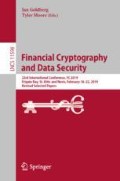Abstract
Trick-Taking Games (TTGs) are card games in which each player plays one of his cards in turn according to a given rule. The player with the highest card then wins the trick, i.e., he gets all the cards that have been played during the round. For instance, Spades is a famous TTG proposed by online casinos, where each player must play a card that follows the leading suit when it is possible. Otherwise, he can play any of his cards. In such a game, a dishonest user can play a wrong card even if he has cards of the leading suit. Since his other cards are hidden, there is no way to detect the cheat. Hence, the other players realize the problem later, i.e., when the cheater plays a card that he is not supposed to have. In this case, the game is biased and is canceled. Our goal is to design protocols that prevent such a cheat for TTGs. We give a security model for secure Spades protocols, and we design a scheme called SecureSpades. This scheme is secure under the Decisional Diffie-Hellman assumption in the random oracle model. Our model and our scheme can be extended to several other TTGs, such as Belotte, Whist, Bridge, etc.
Access this chapter
Tax calculation will be finalised at checkout
Purchases are for personal use only
References
Barnett, A., Smart, N.P.: Mental poker revisited. In: Paterson, K.G. (ed.) Cryptography and Coding 2003. LNCS, vol. 2898, pp. 370–383. Springer, Heidelberg (2003). https://doi.org/10.1007/978-3-540-40974-8_29
Bentov, I., Kumaresan, R., Miller, A.: Instantaneous decentralized poker. In: Takagi, T., Peyrin, T. (eds.) ASIACRYPT 2017. LNCS, vol. 10625, pp. 410–440. Springer, Cham (2017). https://doi.org/10.1007/978-3-319-70697-9_15
Blum, M.: Coin flipping by telephone a protocol for solving impossible problems. SIGACT News 15(1), 23–27 (1983). https://doi.org/10.1145/1008908.1008911
Boneh, D.: The decision Diffie-Hellman problem. In: Buhler, J.P. (ed.) ANTS 1998. LNCS, vol. 1423, pp. 48–63. Springer, Heidelberg (1998). https://doi.org/10.1007/BFb0054851
Bultel, X., Lafourcade, P.: Unlinkable and strongly accountable sanitizable signatures from verifiable ring signatures. In: Capkun, S., Chow, S.S.M. (eds.) CANS 2017. LNCS, vol. 11261, pp. 203–226. Springer, Cham (2018). https://doi.org/10.1007/978-3-030-02641-7_10
Bultel, X., Lafourcade, P.: Secure trick-taking game protocols: how to play online spades with cheaters. Cryptology ePrint Archive, Report 2019/375 (2019). https://eprint.iacr.org/2019/375
Camenisch, J., Stadler, M.: Efficient group signature schemes for large groups. In: Kaliski, B.S. (ed.) CRYPTO 1997. LNCS, vol. 1294, pp. 410–424. Springer, Heidelberg (1997). https://doi.org/10.1007/BFb0052252
David, B., Dowsley, R., Larangeira, M.: Kaleidoscope: an efficient poker protocol with payment distribution and penalty enforcement. In: Meiklejohn, S., Sako, K. (eds.) FC 2018. Lecture Notes in Computer Science, vol. 10957, pp. 500–519. Springer, Heidelberg (2018). https://doi.org/10.1007/978-3-662-58387-6_27
David, B., Dowsley, R., Larangeira, M.: ROYALE: a framework for universally composable card games with financial rewards and penalties enforcement. IACR Cryptology ePrint Archive 2018, 157 (2018). http://eprint.iacr.org/2018/157
Goldwasser, S., Micali, S.: Probabilistic encryption & how to play mental poker keeping secret all partial information. In: Proceedings of the Fourteenth Annual ACM Symposium on Theory of Computing, STOC 1982, pp. 365–377. ACM, New York (1982). https://doi.org/10.1145/800070.802212
Goldwasser, S., Micali, S., Rackoff, C.: The knowledge complexity of interactive proof systems. SIAM J. Comput. 18(1) (1989)
Stamer, H.: Bibliography on mental poker. https://www.nongnu.org/libtmcg/MentalPoker.pdf
Wei, T.J.: Secure and practical constant round mental poker. Inf. Sci. 273, 352–386 (2014)
Yan, J.: Collusion detection in online bridge. In: Fox, M., Poole, D. (eds.) Proceedings of the Twenty-Fourth AAAI Conference on Artificial Intelligence, AAAI 2010, Atlanta, Georgia, USA, 11–15 July 2010. AAAI Press (2010). http://www.aaai.org/ocs/index.php/AAAI/AAAI10/paper/view/1942
Zhao, W., Varadharajan, V., Mu, Y.: A secure mental poker protocol over the internet. In: Johnson, C., Montague, P., Steketee, C. (eds.) ACSW Frontiers 2003, Conferences in Research and Practice in Information Technology, pp. 105–109. Australian Computer Society (2003)
Acknowledgement
We thank Wouter Lueks for his helpful comments and suggestions. We also thank the tarot players of Le Checkpoint Café.
Author information
Authors and Affiliations
Corresponding author
Editor information
Editors and Affiliations
Rights and permissions
Copyright information
© 2019 International Financial Cryptography Association
About this paper
Cite this paper
Bultel, X., Lafourcade, P. (2019). Secure Trick-Taking Game Protocols. In: Goldberg, I., Moore, T. (eds) Financial Cryptography and Data Security. FC 2019. Lecture Notes in Computer Science(), vol 11598. Springer, Cham. https://doi.org/10.1007/978-3-030-32101-7_17
Download citation
DOI: https://doi.org/10.1007/978-3-030-32101-7_17
Published:
Publisher Name: Springer, Cham
Print ISBN: 978-3-030-32100-0
Online ISBN: 978-3-030-32101-7
eBook Packages: Computer ScienceComputer Science (R0)

